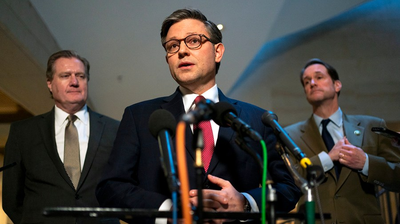
Speaker Mike Johnson (R-La.) is looking to prevent a partial government shutdown by moving a set of spending bills as a single package ahead of Friday’s deadline, according to a source familiar.
Johnson held a private call with GOP lawmakers Friday night and told members his goal is to pass a package of the four bills due Friday, known as a “minibus,” but warned the number of bills included in the package is up in the air, according to the source. Congressional leaders could release the compromise bills as soon as Sunday.
Johnson warned the lawmakers, however, that they will likely be “disappointed” with the final bills if they are expecting “home runs and grand slams” in them, according to a partial transcript of the call. Conservatives have been urging Johnson to insist on a number of controversial policy riders in the appropriations measures.
“I don’t think anybody on this call thinks that we’re going to be able to use the appropriations process to fundamentally remake major areas of policy. If you’re expecting a lot of home runs and grand slams here, I admit you’ll be disappointed,” Johnson said on the call.
“But we will be able to secure a number of policy victories, both in bill text and report language, or other provisions and cuts that severely undermine the Administration’s programs and objectives. These bills will be littered with singles and doubles that we should be proud of, especially in our small majority,” he added.
Funding for military construction and the departments of Agriculture, Energy and Water, Veterans Affairs, Transportation and Housing and Urban Development elapse on Friday. The remaining eight spending bills expire on March 8.
The House returns to session on Wednesday.
Johnson told members Friday night that the number of bills included in the package will depend on how many measures are ready to hit the floor for a vote, according to the source familiar.
There appeared to be some confusion about Johnson’s message Friday to the conference. A lawmaker on the call told The Hill that Johnson said whatever bills are ready next week could be moved individually or in a “minibus.”
The Speaker also floated the possibility of a continuing resolution to extend funding for some programs and agencies as negotiations continue, and acknowledged a short shutdown is possible if negotiators need a little more time to come to a consensus, according to the source familiar.
Johnson, though, said he does not want to have to pass a continuing resolution, according to the lawmaker.
The source familiar with the call noted that “everything is still fluid” because negotiations were still underway over the weekend, and that Johnson “characterized many different scenarios how the next week could go.”
The private GOP conference call Friday night came exactly one week before the first of two government funding deadlines.
Moving the spending bills as a package could frustrate conservative members, who have demanded a return to regular order that includes voting on individual appropriations measures. House lawmakers, however, are up against the clock, returning to the Capitol on Wednesday and facing the first deadline on Friday.
Conservatives have also looked to the appropriations process as a way to secure GOP policy wins and enact spending cuts, demanding a host of riders on hot-button issues like abortion, immigration and slashing the salaries of certain federal officials.
Last week, the House Freedom Caucus wrote to Johnson warning that without those provisions, it would be difficult to get significant GOP support for the appropriations bills. Those matters, however, have been soundly rejected by top Democrats.
The current shutdown showdown marks the fourth time this Congress lawmakers are racing the clock to keep the lights on in Washington.